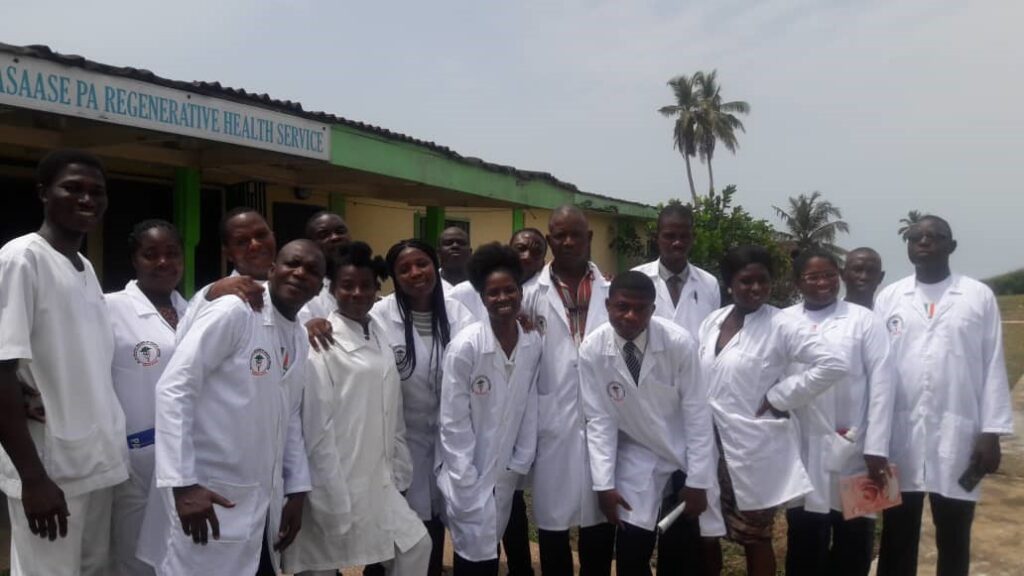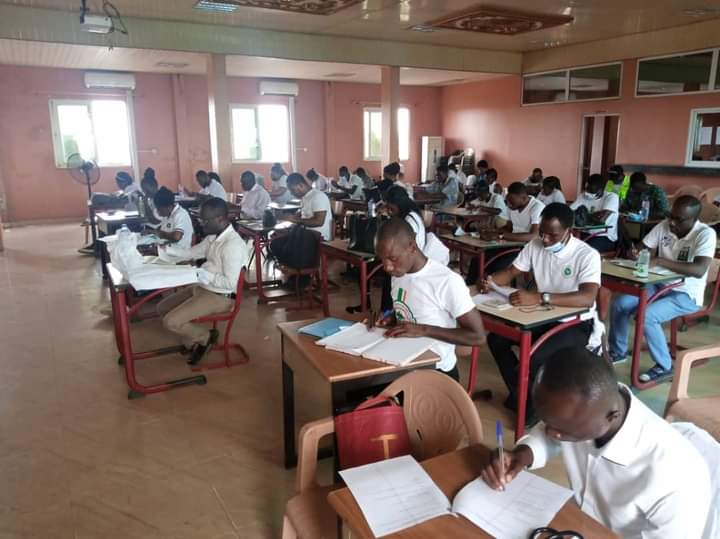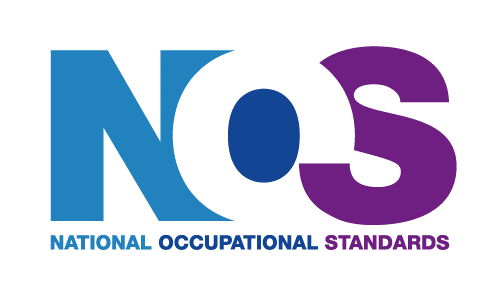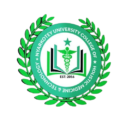ABOUT US
ABOUT US
The Nyarkotey University College of Holistic Medicine and Technology(NUCHMT) was founded to provide Competency-based training(CBT) in Naturopathy and Holistic Medicine.
The College draws from the healing wisdom of many cultures. Since its founding, Nyarkotey College of Holistic Medicine(NHCM) has sought to preserve and convey the classical modalities of African naturopathy and honor the principles that guide naturopathic care:
- The healing power of nature
- Treat the whole person
- First, do no harm
- Identify and treat the cause
- Prevention is the best cure
- Doctor as teacher
OUR HISTORY
When we first created Nyarkotey College of Holistic Medicine programs in 2016, it was with a vision and purpose sitting on a small building inside Dodowa-Akoto House as a distance education center recruiting students for Holistic Medicine Schools abroad. It was formally registered as an educational institution in 2018 when the founder, Dr. Raphael Nyarkotey Obu, as he then was, was introduced to Mr. Daniel Boafo TettehKumasi, Ashanti Region by Mr. Godfred Boateng, one time a General Secretary of GHAFTRAM-Ghana Federation of Traditional Medicine Practitioners. Mr. Daniel Boafo Tetteh further introduced Dr. Nyarkotey to the father and today, here we are!
The goal was to create a University that would be one of the foremost educational institutions for Naturopathic and Holistic Medicine in Africa. We are honored to say that through the collaborative efforts of our distinguished Board of Directors, together with our dedicated international network of professors, clinicians/practitioners, Staff, and a personal, caring, and professional administration, we have proudly fulfilled many of our goals, including developing the first ever National Occupational Standard in Naturopathy & Holistic Health Science leading to the development of the first-ever Bachelor of Health Science Technology in Naturopathy and Holistic Medicine under the Commission for Technical and Vocational and Other Training (CTVET). This was a breakthrough for the profession of Naturopathic Medicine in Ghana and the West Africa subregion which would pave the way for many other programmes in alternative and Complementary Medicine in the Country.
We continue to grow and expand our student base and offerings through new programmes and worldwide opportunities for education. We are also an educational member of the World Naturopathic Federation (WNF) in Ghana. Indeed, Persistence has a reward!
Globally, NUCHMT has now accomplished and established itself by:
- Being one of the first Naturopathic Medical Schools using Biblical principles to educate the public on Naturopathic Medicine.
- Being the pioneer of Competency-Based providers in Naturopathy and Holistic Medicine in Africa.
- Develop the first-ever National Occupational Standard in Naturopathy and Holistic Medicine in Africa.
- Being one of the foremost educational institutions for Naturopathic and Holistic Medicine with national recognition in the world through practical training, and clinical externship.
- Offering training programs that integrate healing practices and knowledge from all disciplines and cultures.
- Providing availability and affordability of education in Naturopathic Medicine for people from all cultures and socio-economic backgrounds.
- We have signed MOUs with recognized Naturopathic facilities and institutions globally.
It is with great pride that we invite you to become a student and create the opportunity to experience personally the exceptional academic programs and life-changing benefits offered by our University. We are fully committed to the freedom of choice in healthcare through holistic health education, integrated medicine, scientific research, and clinical applications. We believe that medicine is not a competition!
We intend to create competent and credible practitioners to be of service through education and healthcare by empowering individuals to take charge of their health and well-being of body, mind, and spirit.
We take solace from what Jesus said in Matthew 9:17: Neither is new wine put into old wineskins. If it is, the skins burst the wine is spilled and the skins are destroyed. But new wine is put into fresh wineskins, and so both are preserved.”
We believe it is time for New wine in the Naturopathic holistic health sector in Ghana and Africa.

VISION STATEMENT
- To be a world-class vocational university of Naturopathy and Holistic Medicine recognized for excellence, innovation, and healthcare catalyst in Competency-Based Education.
- To be the preferred leader in Competency-Based Training in Naturopathy in Ghana and Africa
- To provide groundbreaking and cutting-edge Competency-Based Education for advancing and integrating knowledge in Naturopathic Medicine and sciences.
- To ultimately change the health and well-being of Ghanaians by using Modern Naturopathy to train Competent Naturopaths.
MISSION STATEMENT
- To provide world-class vocational Naturopathic education, training, research, and consultancy services to our students and stakeholders for the development of the nation and beyond.
- To promote, propagate, and train highly qualified Naturopathic Practitioners using Competency-Based Curricula.
- To educate future leaders in Naturopathic Medicine and sciences work with the regulators in Ghana and Africa to help streamline the practice of Naturopathic medicines
ADMINISTRATION OF THE UNIVERSITY COLLEGE
The overall authority of NUCHMT is its Council. Its main operational body is the Academic Board and the Chief Executive Officer, who is the Principal of the College. The Principal is assisted by the Vice Principal and the Registrar.
The Registrar provides administrative support services to the Principal, faculties, departments as well as standing and ad hoc Committees.


STATEMENT OF THE INSTITUTIONAL VALUES
The College has the following core values which will be applied to the achievement of its vision:
Commitment: We are committed to the generation of vocational knowledge using Competency-Based Education that impacts our internal and external communities for healthcare transformation.
Integrity: We accomplished this by applying the principles of Naturopathy, especially the principle of primum noncere . We shall set up high standards of honesty and reliability through policies and environmental sustainability across all our activities for all members of the college for the achievement of academic excellence.
Teamwork and Collegiality: We encourage co-operation among all staff and associates as a means of building interpersonal trust for working as a team at all levels. We nurture and facilitate industrial relationships and research partnerships with local and international organizations which foster knowledge transfer.
Excellence: We shall aim to attain high professionalism in Competency-Based Education, creativity, and continual improvement in every endeavor in our holistic medicine community. We never settle for second best.
Diversity: We shall provide equal opportunities for all categories of persons, irrespective of gender, social, economic, ethnic, religious, and physical capabilities at the Competency-Based Education model.
RESEARCH
At Nyarkotey University College of Holistic Medicine(NCHM), Research is a cornerstone of the university’s mission; it advances knowledge and understanding, underpins instruction, improves the quality of life, and enhances economic development. The learning model applied at the university is based on critical thinking, effective communication, ethical principles, and social responsibility.
Our faculty consistently shows a profound sense of dedication and intellectual vitality; through which they provide our students with a supportive environment that stimulates the learning process in all areas in holistic approaches.
The university’s research efforts bind together three important mission elements:
- Instruction: Researchers engaged in the forefront of science and infuse knowledge and enthusiasm in their classroom teaching, and involve students in work that takes them outside of the traditional classroom experience.
- Economic Development: Our researchers work on problems distilled from the practice of their professions. As a result, their accomplishments may fuel economic growth by defining new products and services and generating new businesses in Naturopathy and Holistic Medicine. Interactions with industry set a context for scholarly research that has both intellectual integrity and utility to transform healthcare.
- Public Service: Knowledge developed in our faculty and students becomes an invaluable asset in policy development and improved operation of government services in Healthcare.
- The University supports and promotes research and scholarly activities by:
- administering sponsored programs;
- ensuring compliance with regulations;
- overseeing research funding and accounting;
- communicating research findings to different audiences;
- enhancing the research infrastructure through laboratories and services;
- providing start-up funds to outstanding faculty; and
- promoting commercialization of products and services based on faculty discoveries and initiatives.

The National Occupational Standards (NOS) specify the standard of performance an individual must achieve when carrying out a function in the workplace, together with the knowledge and understanding they need to meet a standard consistently.
Hence, the National Occupational Standards (NOS) are statements of the skills, knowledge and used in employment, education, and practice. They define the outcomes of competent performance.
This means that for a student pursuing Naturopathy and Holistic Medicine at Nyarkotey University College of Holistic Medicine and Technology(NUCHMT), the NOS for Naturopathy helps to define, areas of expertise and common competencies, helps to define the role of Naturopath, and creates a consistent approach to developing and accrediting training and qualifications.
Hence, on the continent of Africa, Ghana is the only country with National Occupational Standards(NOS) in Naturopathy and Holistic Medicine and one of the few in the world to use this practice module.
Why do we need NOS in Naturopathy in Ghana? NOS has numerous uses in the workplace or the development of the individual. These include recruitment, staff development review, promotion, identifying training or Continuing Professional Development (CPD) needs, and staff planning.
This provides the standard for every graduating Naturopath in Ghana. This standard is about working with individuals to provide naturopathic healthcare. It describes the minimum competence specific to naturopathy. Many naturopaths will have a much wider range of competencies and specialisms than those described here after graduation.
KNOWLEDGE AND UNDERSTANDING
The Graduating naturopath will need to know and understand:
- The development of naturopathic medicine and key naturopathic pioneers
- The similarities and differences between orthodox (conventional) medicine and naturopathic medicine
- the naturopathic principles and philosophy of health and disease
- the principles of:
- the healing power of nature
- identifying and addressing the causes
- first do no harm
- the naturopath as an educator
- treating the whole person
- prevention
- anatomy and physiology which are essential to the understanding of the foundation of disease as understood by orthodox (conventional) medicine and relevant to naturopathic practice
- the function of water, key macro and micronutrients, and their metabolic processes and interactions
- naturopathic perspective of the homeostatic and web-like interactions of physiological processes
- the functioning and interaction among the following bodily systems at the molecular, cellular, and systemic levels:
- skeletal
- muscular
- nervous
- sensory
- endocrine
- respiratory
- digestive
- urinary
- excretory
- reproductive
- circulatory
- lymphatic and immune
- integumentary
- the integration of the above systems and their role in detoxification pathways
- the aetiology and clinical features of a broad range of common diseases in all bodily systems
- the clinical signs and symptoms generated by the body’s response to stress or injury through exposure to toxins, chemicals, physical and infectious agents, and other environmental factors, genetic predisposition, emotional and psychosocial factors
- the impact of stress on bodily systems
- the processes that lead to the breakdown of bodily function and subsequent disease
- common terminology used in pathology
- the actions and side effects of the major classes of orthodox (conventional) drugs and how to access information about pharmaceuticals
- recognized interactions between food, drugs, and supplements within a naturopathic context
- how to take a naturopathic case history and conduct clinical examinations encompassing lifestyle, physical, emotional, nutritional assessment and biochemical aspects
- the types of diagnostic tests and their application to support decision-making
- how to form a naturopathic assessment and evaluation
- how to put naturopathic principles and philosophy of health and disease into practice
- how the results of naturopathic assessment and consultation inform treatment planning
- how to support the client to make informed choices within a wide range of naturopathic approaches
- how to recognize red flag symptoms that require urgent or non-urgent referral to orthodox (conventional) care
- how to advise clients concerning what to expect after treatment, possible discomforts and the reasons for these
- how to support the client during change and recognize progress in health
- how to decide on appropriate actions following the review
- the naturopathic approach to food and diet as a primary means of maintaining and restoring good health
- the naturopathic perspective on the use of food supplements
- the naturopathic perspective of detoxification
- the various detoxification techniques
- how to identify individual situations where detoxification techniques would be appropriate or contra-indicated
- the use and application of physical therapies such as touch therapies, bodywork and exercise within a naturopathic context
- the physiological mechanisms that underpin the principles of physical therapies
- the effects, indications, and contraindications of physical therapies
- the physiological mechanisms that underpin the principles of hydrotherapy
- the use and application of external and/or internal hydrotherapy
- the effects, indications, and contraindications of a broad range of hydrotherapeutic techniques
- the role of emotions in health and disease processes
- the various consultation techniques and natural approaches for addressing emotional issues
- the importance of the basic lifestyle requirements for health
- the impact of the following on health and disease: environment, disposition, behaviour and attitude
- how to advise on stress management
- how to advise on healthy eating
PERFORMANCE CRITERIA(PC)
A graduating Naturopath must be able to do the following:
- conduct a naturopathic assessment, evaluate the approach to be taken, and plan the treatment
- ensure that the environment meets the client’s needs
- ensure that any equipment and materials are ready for use
- position the client for effective naturopathic treatment and give as much comfort as possible
- implement the naturopathic treatment safely, correctly, and following professional codes of practice, legal and organizational requirements
- make appropriate adjustments to the naturopathic treatment to meet any changing needs
- check the client’s well-being throughout and give reassurance where needed
- provide clear and accurate advice concerning the naturopathic treatment, and any relevant aftercare and self-care
- evaluate the outcomes and effectiveness of the naturopathic treatment to inform future plans and actions
- complete and maintain records in accordance with professional and legal Requirements
- Know conditions beyond their scope and provide effective referral pathways to mainstream practitioners.
Professional development
There are additional National Occupational Standards that may be relevant to Naturopathy covering individual therapeutic techniques that link to the competencies described in this document. These may be useful for the future Continuing Professional Development of Naturopaths and curriculum development.
Qualifications for Naturopathy
National TVET Qualifications Framework
The Commission for TVET and Nyarkotey University College of Holistic Medicine and Technology(NUCHMT) has developed the National Occupational Standards for naturopathy in Ghana, which describes the minimum competencies for naturopaths. A practitioner must have completed a standard level and amount of training. The Commission for TVET and Nyarkotey University College of Holistic Medicine and Technology(NUCHMT) set the curriculum for Naturopathy and Holistic Medicine courses in Ghana and it was also approved by the Traditional Medicine Practice Council, Ministry of Health, Ghana.
Hence, a student can take the HND or Bachelor in naturopathy, or one of the fields within naturopathy and Holistic Medicine.
The National TVET Qualifications Framework (NTVETQF) administered by the Commission for Technical and Vocational Education and Training (CTVET), aims to improve and increase the different pathways for TVET graduates. It provides clear entry and exit points for learners and successful graduates.
Our approved HND and BTech Naturopathy and Holistic Medicine programmes under CTVET are under the National TVET Qualifications Framework (NTVETQF). HND Naturopathy is on level 5 and BTech Naturopathy is on level 6.

NATIONAL PROFICIENCY 1
The National Proficiency I Programme is bridging, allowing progression for people with minimal or no education background into the National Proficiency II Programme.
The National Proficiency I Programme focuses on the basic skills, knowledge, and understanding within the Technical /Vocational area.
Recruits to industry will be able to perform routine and predictable tasks often performed under close supervision. Entry into these programmes will normally require no formal Certificate. The Programme will also help the learner to prepare and facilitate his/her progression into the general education band through the introduction to Generic Skills Units.
NATIONAL PROFICIENCY II
The National Proficiency II Programme allows progression to the National Certificate I Programmes and will provide a window of opportunity for technical institutions entrance for appropriate technical/vocational areas.
Entry into the National Proficiency II Programme will be through the achievement of COTVET qualification at the National Proficiency I level.
Recruits to industry will be able to perform a range of varied work activities most of which may be routine, predictable, and non-complex. The individual will work under limited supervision It will also facilitate progression to National Certificate I and introduction to general education through Generic Skills Units.
NATIONAL CERTIFICATE I
The National Certificate I Programme allows progression to the National Certificate II Programmes and will provide a window of opportunity for technical institution entrance for the appropriate technical/vocational areas.
Entry into the National Certificate I Programme will be through National Proficiency II Level or a pass at BECE in the appropriate subjects and or an equivalent.
Recruits to industry will be able to perform complex and varied activities under minimum supervision and also develop employable skills through significant workplace experience learning, thus enhancing their employment prospects.
NATIONAL CERTIFICATE II
The National Certificate II Programme allows progression to the HND or B. Tech programmes will provide a window of opportunity for technical /vocational institution entrance for appropriate technical/vocational areas.
Entry into the National Certificate II Programme will be through a National Certificate I level, or a pass at WASSCE in the appropriate subjects and points total or an equivalent.
Recruits to the industry will be able to perform a wide variety of work, most of which is complex and non-routine. There is considerable responsibility and autonomy in the performance of work, and the ability to control or give guidance to others is often required.
HIGHER NATIONAL DIPLOMA (HND)
The HND Programme allows progression to the Bachelor of Technology (B. Tech) or Master of Technology (M. Tech) programmes and will provide a window of opportunity to technical /vocational institution entrance for the appropriate technical/vocational areas.
Entry into the HND programmes will be through a National Certificate II Level, or a pass at WASSCE in appropriate subjects and points total or an equivalent.
Recruits to the industry will be able to perform a wide variety of work, most of which is complex and non-routine. Work activities comprise tasks involving some level of organizational ability, resource management, and accountability for performing own processes and outputs as well as accountability for the processes and outputs of others.
BACHELOR OF TECHNOLOGY (B. TECH)
The B. Tech Programme allows progression to the Master of Technology programme and will provide a window of opportunity for technical /vocational institution entrance for the appropriate technical/vocational areas.
Entry into the B. Tech Programme will be through a CTVET National Certificate II or HND Level, or equivalent qualification in the appropriate subjects and points.
Recruits to the industry will be able to perform a wide variety of work, most of which is complex and non-routine. Activities are mainly self-directed, requiring a significant degree of strategic thinking and judgment. A high level of organizational and resource management skills are required and the individual assumes full accountability for their processes and outputs as well as the processes and outputs of others within broadly defined boundaries.
MASTER OF TECHNOLOGY (M. TECH)
The M. Tech Programme allows progression to the Doctor of Technology programmes and will provide a window of opportunity to technical /vocational institution entrance for appropriate technical /vocational areas.
Entry into the M. Tech Programme will be through a CTVET HND or B. Tech Level, or equivalent qualification in the appropriate subjects and points. Recruits to industry will be able to perform a wide variety of work, most of which involve the resolution of complex issues making sound judgment in the absence of complex data, and communicating these conclusions to both specialist and non-specialist audiences. They also continue to advance their knowledge and understanding and to develop new skills to a high level.
The M. Tech Programme requires self-direction and originality in tackling and solving problems and acting independently in planning and implementing tasks at a professional level. It promotes quality and transferable skills necessary for employment, initiative personal responsibility, and decision-making in complex and unpredicted situations, and the exhibition of independent learning ability required for continuing professional development.
DOCTOR OF TECHNOLOGY (D. TECH)
The M. Tech Programme allows progression to the Doctor of Technology programme and will provide a window of opportunity to technical/vocational institution entrance for appropriate technical/vocational areas.
Entry into the D. Tech Programme will be through a CTVET M. Tech Level or equivalent qualification in the appropriate subjects and points.
Recruits to industry will be able to perform a wide variety of work, most of which are highly complex. They will be able to make informed judgments on complex issues in the area of technology or professional practice often in the absence of complete data and communicate ideas and conclusions clearly to specialists and non-specialists in the discipline. Recruits will be able to exhibit the qualities and transferable skills necessary to exercise personal responsibility and initiative in a very complex and unpredictable situation.
Career prospects for Naturopathy
There is no better place that is more friendly in Natural Medicine than practicing in Ghana. The outlook of Naturopathy in Ghana is good.
In the first few years after qualifying as a Naturopath, you’re likely to be mostly building your business and clientele. You may find that you adapt and adjust your business and practice as you gain experience and start to recognize themes of need from clients and/or your local community.
You might start to identify specialist areas, build partnerships, and establish strong referral routes. As you become established you may look for opportunities to develop your professional practice and expertise through further training.
Besides one-to-one work with clients, you may also seek to promote your field and reach out to more people through presentations, blogs, books, videos, and articles. You can also work with other private clinics and hospitals in an integrative system.
